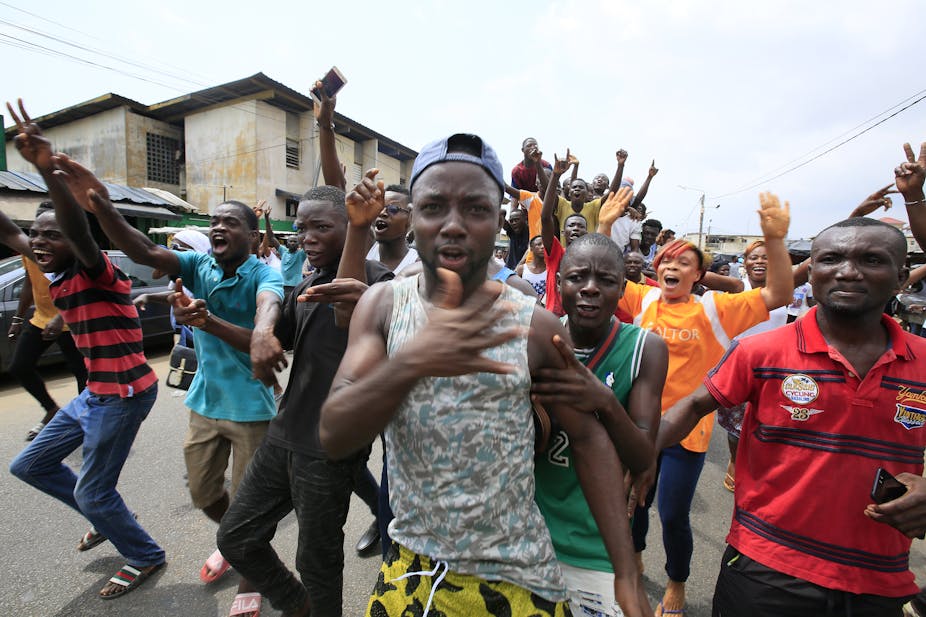Just less than three years into their trial former Côte d’Ivoire President Laurent Gbagbo and Charles Blé Goudé, leader of the youth militia, have been acquitted and ordered to be released by the International Criminal Court (ICC). They were both faced four charges of crimes against humanity. These were murder, rape, inhumane acts and persecution of opponents in the aftermath of the election in Côte d’Ivoire between December 2010 and April 2011. The conflict left over 3,000 people dead.
This is not the first time that judges at the ICC have ordered the release of a person on trial. In 2008 and 2010 the Court ordered the release of Congolese warlord Thomas Lubanga. The reason cited was the prosecutor’s failure to disclose evidence which, it was argued, undermined the defendant’s right to a fair trial. This judgment was rejected on appeal and the court later convicted him in 2012.
In the Gbagbo and Blé case the issues seem to be more substantive. The oral decision suggests that the prosecution had not satisfied the judges that there was sufficient evidence of Gbabgo being part of a plan to keep him in power involving attacks against civilians.
This is a bigger blow for the image of the ICC than the Appeals Chamber of the Court’s decision in June last year to quash the conviction of former Congolese Vice-President Jean-Pierre Bemba after a six year trial.
There have been acquittals of other accused before the Court including Congolese Mathieu Ngudjolo Chui during his trial for the 2003 Bogoro massacre, and in the Kenyan cases against President Uhuru Kenyatta and Vice-President William Ruto for the post-election violence in 2007-8.
Twenty years since states agreed to create the ICC, only three individuals have been convicted, all members of rebel groups. No government or senior official has ever been convicted before the Court.
The Gbagbo and Blé case may give further weight to criticisms of the Court that it has unfairly targeted African countries. But this decision, plus Bemba’s acquittal, indicates a deeper problem with the way in which the Court’s prosecution investigates and collects evidence.
The Gbagbo and Blé decision shows that, on the one hand it is ensuring the rights of defendants – albeit belatedly. On the other hand it denies justice for victims.
A blow for victims
When President Alassane Ouattara took power in Côte d’Ivoire in 2012, his government agreed a package of measures to deal with the past. These included special investigations, a commission of inquiry, a truth and reconciliation commission and a national compensation commission. But in recent years attention and political will have faltered and failed to deliver redress to victims. If Gbagbo and Blé are released, the 727 victims participating in the case at the ICC would no longer be eligible for reparations through the Court. This would effectively close another door on them for redress.
Simone Gbagbo, the former president’s wife, was also supposed to be on trial at the ICC. But she was convicted in an Ivorian court and sentenced to 20 years in 2015 for her role in the post-election violence. While trials have been taking place in Cote d’Ivoire, they have mostly been against Gbagbo’s supporters, with little accountability for violations committed by Ouattaran forces. However, in August 2018 President Ouattara pardoned 800 persons as part of a broader effort to ensure reconciliation in the country. This included the release of Mrs Gbagbo. If her husband and Blé return to Côte d’Ivoire they could be eligible for exactly the same amnesty. Again, in turn, denying justice for many victims.
Immediate release not likely
There will be ongoing hearings at the Court on the schedule for the release of the two men, but not before the prosecutor and victims have their say to the judges and challenge the decision through appeal.
The decision for release was only agreed by two of the three judges, a majority being sufficient. Judge Olga Herrera Carbuccia disagreed from the majority on the standard they used to reach such their decision. She argued that the reasons for the decision should have been set out in writing. So while Gbagbo supporters may be cheering today’s decision, the outcome of proceedings is not yet certain.
Whatever the outcome fundamental questions need to be asked about the way in which cases are prosecuted at the ICC, how best to balance defendants’ and victims’ rights, and more broadly in dealing with international crimes.
In November 2018 the UK questioned whether the Court was worth all the money being spent on it. It pointed out that the Court had cost €1.5 billion over 15 years, but that only three low level perpetrators had been convicted.
The order of the release of Gbagbo and Blé suggests greater attention needs to be paid to two things: how the ICC investigates and prosecutes such cases, and secondly how states deal with such crimes themselves in the first instance, rather for long and costly proceedings at the international level.
The ICC is meant to be a Court of last resort, to ensure justice for victims and end impunity for international crimes where states are unwilling or unable to address such crimes. Yet the potential release of Gbagbo and Blé shows the difficulties in ensuring justice after conflict, in which victims ultimately continue to suffer the cost.

